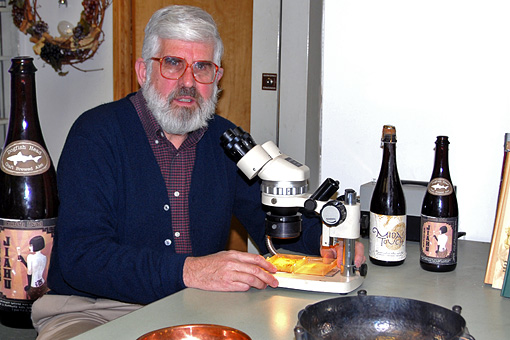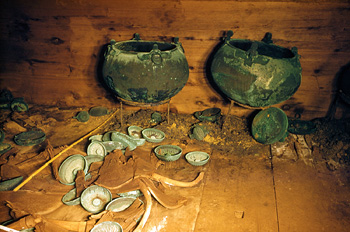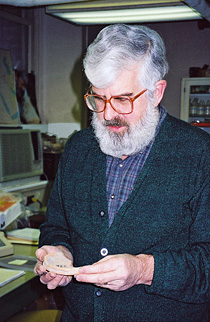
Patrick McGovern '66, scientific director of the Biomolecular Archaeology Laboratory at the University of Pennsylvania Museum in Philadelphia, examines a sample of the “King Midas” beverage residue under a microscope. The sample was recovered from a drinking vessel found in the Midas Tumulus at the site of Gordion in Turkey, dated ca. 740-700 B.C. Re-created ancient beverages -- Midas Touch and Chateau Jiahu -- are seen to his right and left. Photo provided by the University of Pennsylvania Museum.
Biomolecular archaeologist uncorks world's oldest known grape wine
With his bushy white beard and jovial manner, Patrick McGovern '66 seems more like Santa than the "Indiana Jones of ancient ales, wines and extreme beverages."
McGovern, who studied chemistry as a Cornell undergraduate, has chemically identified the world's oldest known grape wine, from Hajji Firuz, Iran, circa 5400 B.C., and the oldest barley beer, also from Iran, circa 3400 B.C.
A pioneer in biomolecular archaeology who is now a scientific director of a laboratory at the University of Pennsylvania Museum, McGovern combines his scientific acumen and advanced anthropological studies with an interest in winemaking and viticulture that originated when he was a teenager in Ithaca. He is the author of two books on the subject: "Uncorking the Past: The Quest for Wine, Beer and Other Alcoholic Beverages" and "Ancient Wine: The Search for the Origins of Viniculture."

The burial chamber of the Midas Tumulus at Gordion in central Turkey. Against the south wall are two of the three bronze cauldrons on their iron stands; scattered on the floor are collapsed wooden tables and bronze drinking bowls and jugs. Photo provided by the University of Pennsylvania Museum's Gordion Archive.
In a seminar hosted by the Department of Horticulture May 3, McGovern told a Malott Hall auditorium full of horticulturists, viticulturists, winemakers, food scientists, archaeologists and historians that he suspects the tradition of fermented beverages goes back even further than 5400 B.C., possibly from the very beginnings of our species in Africa millions of years ago.
In explaining his "Stone Age Beaujolais Nouveau" theory, McGovern said that a primitive leather or wooden container full of collected wild grapes or other high-sugar fruits would quickly ferment in the heat of the fertile crescent, creating a potent juice that would have given our ancient ancestors a surprising new sensory experience.
That led to experimentation -- "the first biotechnology of humans" -- and eventually domestication of Vitis vinifera as a hermaphrodite grape suitable for larger-scale wine production.
McGovern said that wine and alcoholic beverages were an essential part of cultures in Africa, the "homeland of humanity," and around the globe as far back in time as we can go. Not only did they serve important roles as social lubricants that opened people up to one another, but they had medicinal benefits, thanks to the herbs that were dissolved easily into the alcohol. And the seemingly miraculous fermentation process and resulting mind-altering effects led to wine's central role in many religious practices, which can still be seen in our Western religions today.

McGovern holds a jar shard from Jiahu, China, estimated to be 9,000 years old. This shard and 12 others tested positive for a Neolithic mixed fermented beverage, the earliest chemical evidence for an alcoholic beverage anywhere in the world. Photo provided by the University of Pennsylvania Museum.
Fermented beverages might have even contributed to human evolution, McGovern said. Since alcoholic beverages had fewer harmful microorganisms than water, those who drank them probably lived longer and reproduced more.
Other fun facts that McGovern offered: the ancients drank beer through straws; one species of grape (Vitis vinifera) is responsible for 99.9 percent of all wines in the world; and the modern cultivated European grapes have absolutely no genetic relation to wild European grapes, suggesting that they ultimately originated from the mountainous Near East.
McGovern noted that he has traveled the world in search of archaeological and chemical evidence for fermented beverages of all kinds and taken part in "experimental archaeology," in which he uses such evidence to re-create ancient beverages.
One of the beverages he resurrected from the Iron Age was made into a highly successful commercial product. "Midas Touch," produced by Dogfish Head Craft Brewery in Delaware, was based on a recipe McGovern extracted from residue found in vessels buried in a Turkish tomb dating to the time of King Midas, around 700 B.C. The mix of muscat grapes, barley malt, honey and saffron has won numerous medals.
"In order to understand ancient beverages, you also have to test some modern ones," McGovern added.
Stacey Shackford is a staff writer at the College of Agriculture and Life Sciences.
Related links:
Video of McGovern's May 4 talk at Cornell